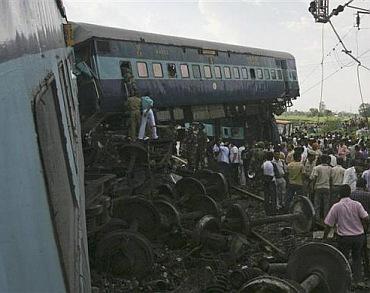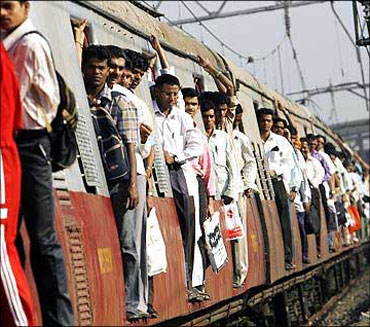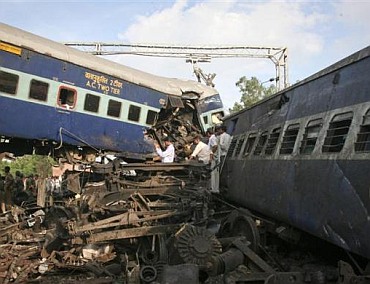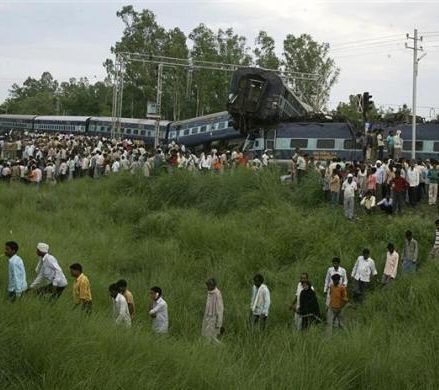Photographs: Jitendra Prakash/Reuters Sahim Salim
Three railway accidents in four days claimed over 100 lives and left as many as 400 injured. According to the latest official figures, between April 2010 and January 2011, over 300 people were killed and 437 were left injured in railway related mishaps. In all, this year alone has seen six major railway accidents. Sahim Salim wonders why.
The Indian Railway network is the world's fourth-largest network. On an average, about 18 million people travel on Indian trains every day. Even though experts say that the number of accidents has been consistently going down over the years, they admit that such large number of accidents happen regularly, which is alarming for the state run network.
Rediff.com spoke with ex-members of the Railway Board, who opine that in addition to train "overloading", low investments, vacant posts, human errors and political interference are the biggest challenges the Indian Railway network faces.
In addition to the railway ministry running without a Cabinet Ministry since Mamta Bannerjee became West Bengal Chief Minister in May this year, there are about two lakh vacant posts in the Railways and most of these are in safety or in operations.
...
'Overloading is a major concern'
Image: An overcrowded Mumbai localPhotographs: Rediff Archives
"The biggest problem the Indian railway network faces is train overloading. Within 20 years, the Indian railway network has been carrying more than 15 times the traffic it used to on the same tracks. The loading capacity per wagon on goods trains also has gone up considerably, which is strenuous for the old tracks," says MS Rana, former chairman of the Railway Board.
"What has to be understood is that the old tracks have a certain life. Due to train overloading, these tracks can be damaged," he adds.
Over 16,000 trains run on the Indian Railway network every day, which translates into operations running into several lakhs. And India's railway network has so long been ignored that investments are negotiable. Non-implementation of adequate technology means dependence on humans to run the network.
...
'There are no zero-accidents railway systems'
Image: People search the mangled carriages of the Kalka Mail train which derailed near FatehpurPhotographs: Jitendra Prakash/Reuters
"There are a million operations to be done in a day. Such a huge system always has to feature one, two or three factors which can lead to an accident. There are no zero-accidents railway systems anywhere in the world; even ones that run on minimum human monitoring cannot claim zero accidents," Ran adds.
"So it is obvious that Indian Railways have to factor human errors as a major cause for accidents because we largely depend on humans to run the network," Rana says.
The 2011 Comptroller and Auditor General Report states that in addition to not being able to fill in vacant security-related posts, the Indian Railways is behind schedule to develop new technologies that could reduce risks in the network.
"Because of the vastness of the Indian network, we have not been able to induce technology in the network the way we want to. The implementation of these technologies will take a long time due to various factors. Political constraints is one of them," Rana admits.
...
'The are political constraints in allocating finances'
Image: People search the mangled carriages of the Kalka Mail train which derailed near FatehpurPhotographs: Jitendra Prakash/Reuters
Another senior railway official, who wished to remain anonymous, says that political constraints came mainly in allocating finances.
"Several new lines are introduced, which do not necessarily generate money or profits for the network. They are done mainly due to political compulsions. Policies are short-sighted and political nods are given to projects which do not get the green signal from officials actually running the network," the official says.
When asked, Rana admits that financial constraints arise mainly because of political compulsions.
"When finances come in, there are several ways the officialdom might want to invest it, which will differ from how the government wants it invested. Having said all this, it has to be added that the number of accidents have consistently been decreasing over the years. The one thing that needs to be improved is the speed of implementation," Rana says.





article